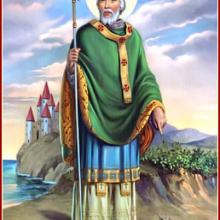Holidays
The Centers for Disease Control and Prevention recommend celebrating the holidays only with the people you live with. In this recommendation, I hear a resigned invitation to make it work with what we have. Let us draw lessons from those who have long had to make it work. And in that, I offer a prayer.
Though Thanksgiving 2020 isn’t canceled—like just about everything else this past year—it needs to be different. Because of this, it is currently not safe to travel or gather in the ways many of us typically do. This need to do differently has left many Christians split and pitted against one another.
Everyone is supposed to love Christmas and the holidays. It’s supposed to be a time of family and gratitude. But I dread them. I dread the weeks leading up to Christmas, starting the day before Thanksgiving when Christmas carols begin permeating the radio and stores and build to a crescendo through Christmas Eve. The growing darkness in the absence of daylight saving time doesn’t help.
Telling stories that encompass the scope of experience help us understand those whose experiences are different from our own. Amidst current racist, sexist political rhetoric and threats of more to come, we’re going to need more stories that bridge that gap.
As October quickly turned to November, jack-o-lanterns and costumes were replaced by Christmas carols and Internet outrage over holiday cups. Every year we go from Halloween to Christmas with little space carved out for Thanksgiving.
There is no question that Thanksgiving is my favorite holiday. Many times I have remarked that Thanksgiving is one of the greatest days of the year, that I cannot wait to go home, that Christmas needs to wait until December. Come every November, I begin my internal countdown, growing more excited each day closer to this holy holiday.
We often reserve the word “holy” for holidays such as Christmas and Easter, but for a multi-faith family such as my own, a holiday grounded in something more substantial than – let’s say trees for Arbor Day – while still allowing everyone to come with their own religious identity is not only a privilege, but a gift.
For Catholics, Episcopalians and some Lutherans, March 17 is the Feast Day of St. Patrick. For the rest of us, it’s St. Patrick’s Day — a midweek excuse to party until we’re green in the face. But who was Patrick? Did he really drive the snakes out of Ireland or use the shamrock to explain the Trinity? Why should this fifth-century priest be remembered on this day?
Q: Was St. Patrick a real guy, and would he approve of green beer?
A: Yes, Patrick was a real person, but not much is known of his life. He was born in the late 300s when the Roman Empire extended to England, so he was not “really” Irish — like the vast majority of people who celebrate his day. In his “Confessio,” one of only two surviving documents attributed to him, Patrick wrote that while his father was a Christian deacon, he was not devout. At age 16, Patrick was captured by Irish marauders, carried across the Irish Sea and enslaved. Patrick spent six years alone in the wilderness tending his master’s sheep, praying constantly. “It was among foreigners that it was seen how little I was,” he wrote. He began to have visions and hear voices that told him: “Look, your ship is ready.” So Patrick left his first flock and walked 200 miles to the coast. It’s a pretty safe bet he would have loved a beer, green or otherwise, as he stepped into a boat bound for England.
I love Thanksgiving.
I love the food, the fellowship, the friends and family, the football, and did I mention that I love the food. Unashamedly it might very well be my favorite holiday. Yet, despite all my warm feelings about Thanksgiving, I am not blind to its historical shortcomings.
As Jane Kamensky says, “…holidays say much less about who we really were in some specific Then, than about who we want to be in an ever changing Now.” I think she’s right about this. In so many cases, our national celebrations and observances are mere expressions of our collective aspirations and not our actuality. One clear example of this is the history and practice of the Thanksgiving holiday.
As it goes, every year people throughout this nation gather for a commemorative feast of sorts where we give praises to God for the individual and collective blessings bestowed upon us. This tradition goes back to the 17th century when the New England colonists, also known as pilgrims, celebrated their first harvest in the New World.
On the surface, this seems harmless enough but a closer reading of history tells a more dubious story.
As a survivor of the Sept. 11 terrorist attacks on the World Trade Center, I worry about how we will remember that tragic day 50, 100, even 200 years from now.
I worry because our nation does a poor job of commemorating our most historic heroes and events. Our efforts to honor history consistently lead to one of two disappointing outcomes.
Our official holidays have become increasingly commercialized. Consider the relatively recent exploitation of Thanksgiving and Martin Luther King Jr. Day.
Virtually all other anniversaries have been marginalized. Consider how little attention is paid each summer to the July 20th anniversary of the first Apollo moon landing, one of humanity’s most impressive achievements.
Light is important to us. Those of us who live in the Midwest are reminded of how much we need it during this time of year. The sun sets early. On so many days, our sunlight is tinged with gray as it seeps through the clouds.
Light seems to be in short supply.
All of the festive holiday Christmas lights have been put away, leaving the darkness unchecked. We recently had religious celebrations that involved lighting candles on our menorahs, on our advent wreaths and our dinner tables. Many people celebrated the birth of a Jewish rabbi who urges everyone to be a light to the world.
Don’t wait for someone else to bring the light. Be the light.
If there is indeed a “War on Christmas,” those on the anti-Christmas side of the war have lost — big time.
The television pundits, conservative politicians, and talk-radio loudmouths who believe there is a “War on Christmas” should look around, withdraw their troops, and quit screaming. Because if there is a war on Christmas, Christmas has won.
As Christmas approaches, tens of thousands of churches around the country are planning Christmas services and expecting packed pews. Their choirs are rehearsing Christmas music; and church members have taken the Nativity scene figures out of storage and put them on church lawns. Children costumed as kings and shepherds are learning to sing “Away in the Manger.”
Christmas cards with manger scenes are speeding around the country through the U.S. Postal Service or in the form of online animated greetings that play “Silent Night” and show the wise men following the star to Bethlehem.
Nearly one in three Americans, including many with no little children at home and those with no religious identity, say they pretend Santa will visit their house on Christmas Eve.
Overall, 31 percent of U.S. adults play up the Santa role in their holiday season, according to a survey released Wednesday by the Pew Research Center.
Jesus, however, is still the star of Christmas.
Brace yourselves. The calendar has turned over to December, which means that the inevitable discussion on the “War on Christmas” will soon see it’s opening salvo for 2013.
It is inevitable. There will be an outrage by a prominent figure about how we have lost our moral fabric because as someone was buying gifts with money they don’t have to impress people that they don’t always like, the cashier will commit the unthinkable sin of wishing us a “Happy Holidays” instead of “Merry Christmas.”
There will be gnashing of teeth as a town or city somewhere will have a “Holiday Parade” rather than a “Christmas Parade,” as Tulsa had done several years ago. (The parade was subsequently boycotted by one of it’s senators.)
The chorus of those who would profess to be Christians will shout that the “Political Correctness Police” have overstepped yet another boundary and that we should not take the “Christ out of Christmas” as the batch of perceived slights against Christendom freshly reveal themselves for this holiday season.
As a person who would say that Jesus is the most important thing in my life, who has devoted my life to the service of God’s Kingdom, and spends all of my waking moments trying be faithful to that devotion, I have to ask: “What exactly do we mean by putting the ‘Christ back in Christmas'?”
It's started.
I was following the Twitter feed for the conversation between Nadia Bolz-Weber and Amy Butler at Calvary Baptist Church in Washington, D.C. (#nadiaandamy) about the present realities and possible futures of Christianity in the United States, and it happened. I was happily dividing my cognitive attentions between Twitter and the television when it happened.
There was a Christmas ad.
A lot of ink, pixels, and air have been used on the potential effects of the so-called “fiscal cliff.” While many experts say that “cliff” is a misnomer (it’s more of long slope in the wrong direction), there is at least broad agreement that it’s not the right direction for the country’s long-term health.
We’ve heard a lot about the potential effects on Wall Street, our nation’s credit rating, and even the military. But little has been said about the devastating consequences for our nation and the world’s poorest and most vulnerable people — or for the charities and non-profits that serve them.
This week, the Circle of Protection, released an open letter to the president and Congress with a simple message: during the holidays, please “advance policies that protect the poor — not ones that make them poorer.”
NEW YORK — The "October trifecta" that touched my life — my father's death, surgery the next day, and the unprecedented destruction of Hurricane Sandy around New York — did what traumatic events often do.
They left me emotionally fatigued and ready for some fresh clarity, fresh perspective, and fresh prioritizing.
When life seems fragile, it's clear some things matter more than others. It reminds us that attention must be paid to family, friends, and the differences we make in our work and our faith. Lesser concerns — like the tablet computer I have been angling to acquire — quickly fall away.
Whether it's variations on familiar holiday tunes, cartoons prancing around on screen, or watching kids open terrible presents, treat yourself to a break from the day to take in a little holiday cheer.
 Whenever I give talks on the effects of the Israeli occupation on Palestinian livelihood, the status of nonviolence as a means to resisting the occupation, and how I believe nonviolence is the only way to move forward to resolve the conflict and create a lasting peace between Israelis and Palestinians, one of the first and immediate questions I get from foreign visitors to my office in Bethlehem is, What you said is good, but what about the Muslims? Do they also believe in nonviolence? Do they understand it?" Even if I don't mention religion in my presentation -- and I rarely do -- this question always seems to make its way in our discussions.
Whenever I give talks on the effects of the Israeli occupation on Palestinian livelihood, the status of nonviolence as a means to resisting the occupation, and how I believe nonviolence is the only way to move forward to resolve the conflict and create a lasting peace between Israelis and Palestinians, one of the first and immediate questions I get from foreign visitors to my office in Bethlehem is, What you said is good, but what about the Muslims? Do they also believe in nonviolence? Do they understand it?" Even if I don't mention religion in my presentation -- and I rarely do -- this question always seems to make its way in our discussions.
I went into a Christian bookstore the other day and was surprised to see some of the most prominent display space given over to military flags for the U.S. Army, Navy, Air Force, and Marines. These flags, and a vast assortment of Americana merchandise, were on sale for the holidays.














